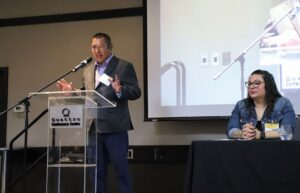Mental Health and opioid addiction key priority at Anishinabek Health Summit

By Jesse Johnson
SAULT STE. MARIE – The Anishinabek Nation’s Health Secretariat held its inaugural Mental Health and Opioid Addiction Summit on May 24 and 25 at the Quattro Hotel and Conference Centre in Sault Ste. Marie, Ont., with more than 120 guests in attendance.
Elder Mary Elliott from Atikameksheng First Nation shared the Opening Prayer where she spoke about the importance of water and how cleansing, calming, and refreshing it is.
Ojibways of Garden River First Nation Chief Andy Rickard provided opening remarks and welcomed participants to his community’s traditional territory.
“We’ve lost community members and we’ve suffered; addiction has not only impacted families but the community as a whole,” he expresses. “I think it’s fitting that we’re having this Summit in Sault Ste. Marie. It’s no secret that this is one of the worst areas for opioids and drug addiction. It doesn’t take much to drive downtown and see the impact drugs have had on this area.”
“Mental health is a tough topic at the Anishinabek,” adds Anishinabek Nation Lake Huron Regional Deputy Grand Council Chief Travis Boissoneau. “The communities are struggling with mental health and addictions; the realities are harsh and the challenges are real.”
Event Organizers Tim Ominika, Mental Health and Addiction Systems Specialist, and Katie Pine, Opioid Strategic Planning Specialist, shared some of the recommendations from a Mental Health, Addiction, and Opioid Summary Report that was completed earlier this year.
“If we work collectively, we can attack these problems more effectively,” says Ominika.
Loretta Nootchtai and Gerrilynn Manitowabi, members of the Health Transformation Team, provided a short overview of the project and its objectives.
“We are currently meeting with each First Nation’s Chief and Council so that we can introduce Health Transformation and discuss the best ways to move forward with this important initiative,” says Nootchtai, Health Transformation Project Manager.
Participants heard presentations from different land-based program representatives including David George and Michelle Manitowabi who spoke about Wiikwemkoong’s Naandwe Miikan program; Sam Gilchrist who presented on the Aundeck Omni Kaning’s Gwekwaadziwin Miikan program; and, Elizabeth Richer and Dorothy Coad who discussed North Shore Tribal Council’s Niigaaniin’s Mamaweswen program.
A Youth panel focused on sharing lived-experiences, which consisted of panelists Robert of Nipissing First Nation, and Daimien and Mandy from Wiikwemkoong Unceded Territory.
Jonathan Peltier of Wiikwemkoong Unceded Territory presented on Reintegration from Incarceration: Overcoming Barriers to Mino Bimaadiziwin.
“When you disappoint people, it plays a lot on your mental being. You feel low. The Grandfather Teachings taught me that when I speak about my truth, then I need to be honest.”
On Day 2 of the Summit, participants heard presentations from Dr. Andrea Sereda, Physician at London Intercommunity Health Centre, who spoke on Providing Harm Reduction for Marginalized People, and Dr. Jonathon Bertram, Addictions and Pain Medicine Physician, who presented on the Effects of Addiction Treatments on the Brain.
There was also a panel discussion prior to the closing remarks.
“Congratulations to Tim, Katie and the whole team for making this Summit a huge success,” says Jamie Restoule, Anishinabek Nation Health Director. “We still have a lot of work to do in order to better support our communities with their mental health and opioid problems, but I’m confident we’re moving in the right direction.”
For more information about the Anishinabek Nation’s Health Secretariat, visit www.anishinabek.ca.

